
After months without access to water, Arizonans in the unincorporated Rio Verde Foothills – just east of Scottsdale – have a temporary solution after Gov. Katie Hobbs signed a bipartisan bill Monday to restore water to the area.
Senate Bill 1432 will require Scottsdale to allocate water resources for three years via a newly established standpipe district.
A standpipe district refers to a designated area or region where a standpipe, typically a vertical pipe or tower connected to a water supply system, is installed to provide water access to residents or communities. The standpipe serves as a centralized point for individuals to obtain water.
“This bipartisan bill shows that when we put politics aside, we can come together to solve problems for everyday Arizonans. While it isn’t perfect, I’m glad we were able to deliver relief for the residents of Rio Verde Foothills,” Hobbes said in a statement on June 19.
Sen. Justine Wadsack, R-Tucson, said that “Water is life, water is God-given, and everyone has the right to access it.”
“Access to water is the future of Arizona. Water has been an issue for years now, and this is just the beginning to real solutions,” she said of her bill.
Prior to Hobbs’ bill, Scottsdale had been providing water through a standpipe for over ten years, allowing private haulers and residents to access it, even though the city nor Maricopa County did not bear legal responsibility for the water service in the suburb due to its wildcat subdivision, or unincorporated status.
At the same time, some 1,000 residents residing in the small suburb relied on water supplied through the standpipe managed by Scottsdale. With local wells being unreliable and distant journeys to alternative standpipes, the future appeared grim for these residents.
In anticipation of reductions in Colorado River water consumption across the state, which city officials believed would affect their own water supply, Scottsdale cut off access to Rio Verde Foothills in January – causing local officials to scramble for a solution.
Maricopa County Supervisor Thomas Galvin applauded Hobbs’ effort but said he was “cautiously optimistic” about the bill. The conservative official hoped to have the City of Scottsdale enter into an agreement with a private water utility company instead, which would “not require creating another layer of government.”
“Needlessly creating additional bureaucracy when a sound private third-party based solution was attainable is concerning to me as a conservative Republican. But SB 1432, an emergency measure that means the law will take effect immediately, seems like the compromise to fast-track water to RVF in the short-term,” Galvin said in a statement.
During a hearing of SB 1432, lawmakers acknowledged that the legislation may not offer a flawless solution, but said they remain committed to ongoing efforts aimed at tackling the challenges posed by wildcat subdivisions and ensuring long-term water availability in the state of Arizona.
Republished with the permission of The Center Square.













